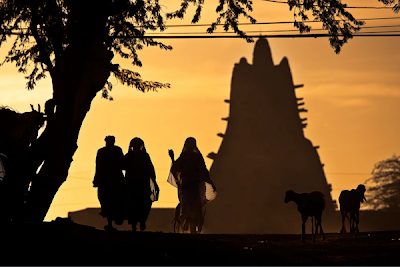During 2009 and 2010 photographer Brent Stirton spent a month in total documenting life in Timbuktu, Mali for National Geographic magazine.
“This is a modern essay on a legendary city, historically one of the wealthiest in Africa
and for centuries strictly forbidden to non-Muslims. Strategically
situated at the northern apex of the Niger River and the southern shore
of the Sahara Desert, for hundreds of years Timbuktu dominated the trade
for gold, ivory, and slaves from the African interior as well as
spices, cloth, and books brought by caravan from the Mediterranean
coast. It was a city of considerable scholarly endeavor. In the tenth
century Timbuktu contained one of the greatest universities in the
world. It was home to hundreds of learned tutors, who maintained
extensive libraries of manuscripts concerning history, science,
religion, literature and the study of the Koran. . As its wealth grew,
the city erected grand mosques, attracting scholars who, in turn, formed
academies and imported books from throughout the Islamic world. As a
result, fragments of the Arabian Nights, Moorish love poetry, and
Koranic commentaries from Mecca mingled with narratives of court
intrigues and military adventures of mighty African kingdoms.
Today’s Timbuktu is a very different place, a dusty footnote in northern Mali,
the last major settlement on the edge of a vast Saharan wasteland. But
amid claybrick buildings, Timbuktu scholars are once
again piecing together the African
history that once filled vast libraries in the city’s heyday. There is
also a darker side to modern city, drug
cartels, which smuggle cocaine through the desert to the Mediterranean
coast and on to Europe.
According to Interpol, some $2.2 billion worth of cocaine is funneled
annually through the region. At the center of this tumult are the
Tuareg, the turbaned nomads who have inhabited this part of the Sahara
for centuries. For much of the last three years, Tuareg groups in Mali
and Niger waged violent rebellions against their respective governments,
seeking a greater voice in how their lands and resources are
administered. Though a peace deal was brokered earlier this year, the
conflict has left much of the region impoverished and awash in weapons
and unemployed former fighters. Observers in the region worry that many
of these young men could fall under the sway of AQIM and the cartels.”
via reportagebygettyimages.com
Also read: Malians seethe over desecration http://mg.co.za/article/2012-07-05-malians-seethe-over-desecration/








No comments:
Post a Comment